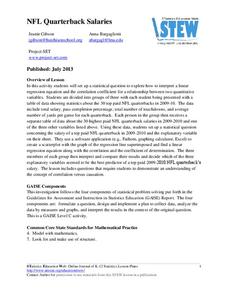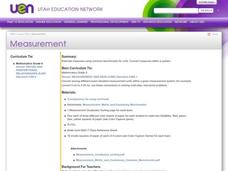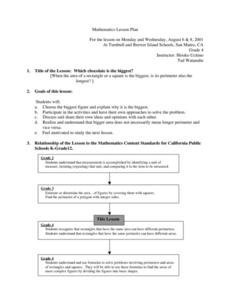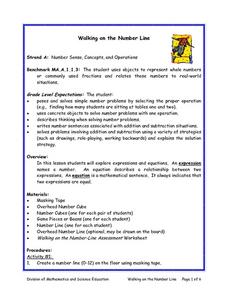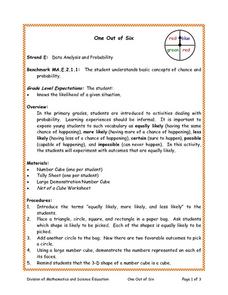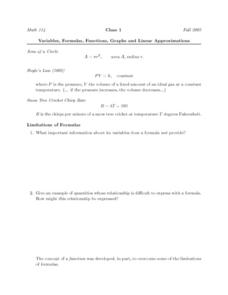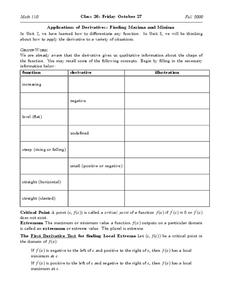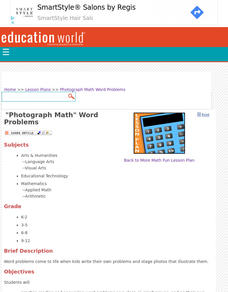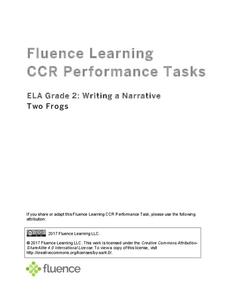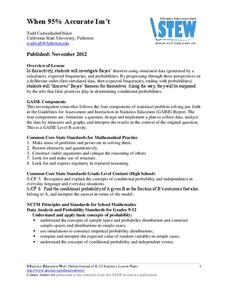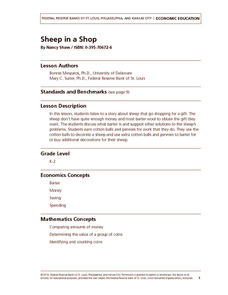Fluence Learning
Writing an Opinion: Is Pride Good or Bad?
Does pride really goeth before the fall, or can it be essential to one's development? Second graders read two of Aesop's fables that refer to pride in their morals, and write a short essay about whether pride is good or bad, based on...
Fluence Learning
Writing an Argument: Is Electronic Communication Helpful or Harmful?
Technology has undoubtedly improved the lives of people around the world—but has it improved communication? Seventh graders read two informative passages about the rise of texting and emailing versus in-person conversations before...
Statistics Education Web
NFL Quarterback Salaries
Use statistics to decide if NFL quarterbacks earn their salaries! Learners study correlation coefficients after using technology to calculate regression equations. Through the data, they learn the meaning of correlation and correlation...
University of Colorado
Are All Asteroids' Surfaces the Same Age?
Did you know scientists can tell the age of an asteroid by looking closely at its craters? This final lesson of a six-part series focuses on two asteroids, Gaspra and Ida, in order to demonstrate the concept of dating asteroids. Scholars...
Curated OER
Calendar Time
Use circle time to work on counting. Kindergarteners practice the months of the year, say the full date, chart the day's temperature, count to 100, and sing the alphabet song. This kind of daily routine cultivates deep roots for...
Curated OER
How Much Is A Million
Help young learners visualize the concept of "a million." To convey concepts of numeration and literacy, they will listen to the book How Much is a Million? by David Schwartz. They should be able to make self-to-text connections....
Curated OER
Linear Equations Game
Students participate in a mathematics game in order to investigate the concept of linear equations. They practice using rotations of the game to solve the equations. The teacher can intervene as necessary.
Curated OER
Counting and Writing Numbers 1-20
Learners connect quantity with numbers from 1 to 20 in this 2-part exercise. First they count the number of circles in a row and write the appropriate numeral from 1 to 10. In the second part, they count objects from 11-20. To extend:...
Curated OER
Measurement
Students explore the concept of measurement. In this measurement lesson, students discuss what specific measurement tools such as an odometer measure. Students recite a measurement poem. Students make a foldable with conversion units...
Curated OER
Which Chocolate Is The Biggest?
Students investigate the concepts of area and perimeter with the use of chocolate bars. They calculate the perimeter and area of different size rectangle chocolate bars and record the statistics. Then students make a visual comparison...
Curated OER
What Makes Ten
Students investigate the concept of ten and how it is part of the real number system. They find the quantity of ten using as many combinations as possible. They can count using manipulatives, write on paper, or by doing mental math.
Curated OER
Time
Students review the concept of the hour. In this time lesson plan, students understand how the hour hand works. Students have another clock which also shows the minute hand. Students recognize the position of the minute hand.
Curated OER
Walking On The Number Line
Learners investigate the concepts of expressions and equations while defining the similarities and differences. They explore the operations by using a number line and record answers while working with the teacher. Students play the game...
Curated OER
One Out of Six
Students investigate basic concepts of chance and probability. They make a number cube to predict which number might be rolled the most often out of 20 consecutive rolls and tally the results. Number cube template included.
Curated OER
Variables, Formulas, Functions, Graphs and Linear Approximations
In this limitations of formulas worksheet, students answer four essay questions about functions. Two questions refer to the limitations of formulas. They graph one function and explain how it specifies the rule of the function.
Curated OER
Applications of Derivatives: Finding Maxima and Minima
In this derivatives worksheet, students complete a function chart by telling the type of function, the derivative, and making an illustration of the concept. They find the intervals at which a given function is increasing or decreasing....
Curated OER
"Photograph Math" Word Problems
Young scholars create a photograph that illustrates one of the ways in which they use math. For this math and visual arts lesson, students write their own real-life word problems to accompany the photo.
Curated OER
Addition and Subtraction Word Problems Guided Lesson
Using visuals helps young mathematicians grasp concepts such as addition and subtraction. Here, they use just that to solve three scenarios. In the first scenario, three turtles leave a group of five, and learners determine how many are...
Curated OER
Reading Venn Diagrams
Venn diagrams are useful in so many ways. The class views a worksheet to assist them in understanding how to compare two items based on similarities and differences. Children compare four different items using partially completed Venn...
Mathwire
Shamrock Paths
What could St. Patrick's Day and Pascal's triangle possibly have in common? Trace the pattern in a holiday-themed learning exercise that prompts learners to find the word shamrock as many times as they can.
Fluence Learning
Writing a Narrative: Two Frogs
Three options offer young writers the opportunity to read a short story, answer questions, and write a response. A handy language arts resource focuses on reading comprehension and analyziing the story's lesson: look before you leap.
Statistics Education Web
When 95% Accurate Isn’t
Investigate the effect of false positives on probability calculation with an activity that asks scholars to collect simulated data generated by a calculator. To finish, participants analyze the probability of certain outcomes which lead...
Federal Reserve Bank
Sheep in a Shop
What do you think sheep might be able to barter when they don't have quite enough to buy a gift? Your pupils can find out this and much more during this lesson about Sheep in a Shop, spending, saving, and bartering.
Teach Engineering
Machines and Tools (Part 2)
Which pulley system will give us a whale of a good time? Teams compare the theoretical and actual mechanical advantages of different pulley systems. They then form a recommendation for how to move a whale from an aquarium back to the ocean.




